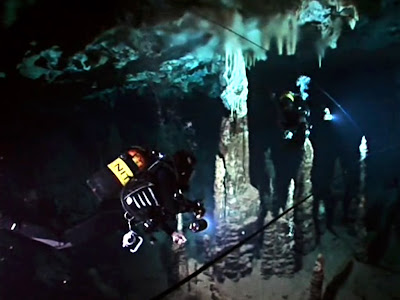
The secrets of the earth’s oceans have remained largely undiscovered. Our oceanographic exploration team is trying to put the world’s oceans in a human scale. This time the expedition is headed for the Mediterranean, which last time the Cricket checked wasn’t technically an ocean, but we are informed it is in fact the remains of an ancient ocean. It is home to about ten percent of the planet’s marine life, Western civilization developed around its shores, and the hundred million visitors every year are having a profound effect on these waters. When maritime archaeologist Lucy Blue sets out to dive the remains of a Roman shipwreck, I was hoping for a site of a naval battle during the First Punic War, because they do take us to near the Egadi Islands (site of the war’s last battle in 241 BCE). Alas, all we get is a pottery field of amphorae. Truly incredible, though, is the footage of Paul Rose and Tooni Mahto seemingly flying through the clear water of an underwater cave beneath Mallorca. Spectacularly sculptural stalactites and stalagmites indicate that tens of thousands of years ago these caves were above the water line until the sea level rose and flooded them with salt water.
Around the submerged Ferdinandea volcano, created by the collision of the European and African continents, the team learns that industrial fishing has extinguished larger fish such as sardines and tuna – indicating that the entire eco-system may be at risk. Environmentalist Philippe Cousteau Jr. then inspects a blue-fin tuna farm. Glad as he is seeing these beautiful fish, he is obviously enraged, knowing how they are on the brink of extinction once again due to overfishing. Later, Philippe and the team search for the great white shark, as the Sicilian Channel is a nursery for its juveniles. But despite all their efforts they remain unsuccessful. In the Straits of Messina (where the First Punic War commenced), however, expedition leader Paul Rose is able to sight the prehistoric six-gill shark, the largest living predatory fish. And what a marvelous sight it is!
Around the submerged Ferdinandea volcano, created by the collision of the European and African continents, the team learns that industrial fishing has extinguished larger fish such as sardines and tuna – indicating that the entire eco-system may be at risk. Environmentalist Philippe Cousteau Jr. then inspects a blue-fin tuna farm. Glad as he is seeing these beautiful fish, he is obviously enraged, knowing how they are on the brink of extinction once again due to overfishing. Later, Philippe and the team search for the great white shark, as the Sicilian Channel is a nursery for its juveniles. But despite all their efforts they remain unsuccessful. In the Straits of Messina (where the First Punic War commenced), however, expedition leader Paul Rose is able to sight the prehistoric six-gill shark, the largest living predatory fish. And what a marvelous sight it is!

No comments:
Post a Comment
Note: Only a member of this blog may post a comment.